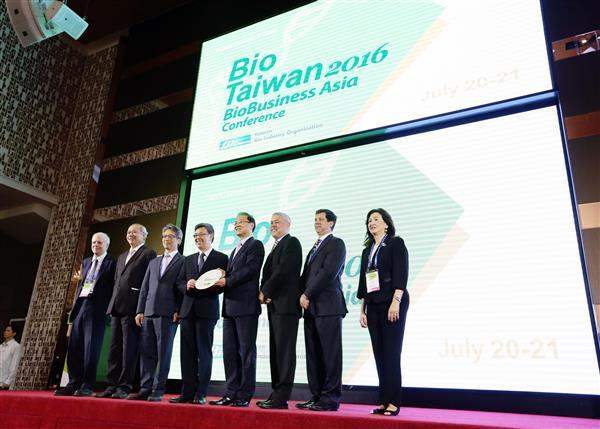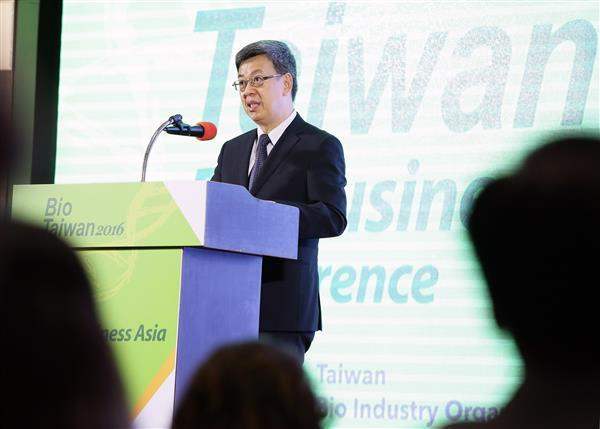News & activities
 News releases
News releases
2016-07-20
Vice President Chen's address at BioBusiness Asia Conference
Taiwan Bio Industry Organization Chairman Chong-his Lee (李鍾熙), President James C. Liao (廖俊智) of Academia Sinica, leaders of this exciting industry, distinguished international guests, members of the media, ladies and gentlemen, dear friends:
Good morning everybody!
It is really my great pleasure and honor to join you at BioBusiness Asia, the very first event of BioTaiwan 2016. BioTaiwan is the premier biotech event in Taiwan, and one of the largest in Asia. Please join me in applauding the organizers for putting it all together!
In recent years, biotech has advanced so fast, a whole "bio-economy" has emerged, and people are dreaming big: Solutions to health problems that were never possible before, and business opportunities that seem endless.
Taiwan has been a fast riser in this field, and we are determined to become a leading hub where the best in the world come together to push biomedical technology into new frontiers.
I. Taiwan's biotech industry is strong and promising
Getting to this point has not been easy. Our government identified biotech as a key technology for development back in 1982, but we did not have enough experiences in integrating resources, policy and capital.
For instance, in the 1980s Taiwan tried to produce local supplies of diagnostic reagents and plasma-derived vaccines for hepatitis B control, and also to start our biotech industry. Later studies showed that this initiative led to very successful reduction in mortality from hepatitis B, cirrhosis, and liver cancer using this hepatitis B immunization program. However, at the time, we lost out to Merck's new recombinant vaccine, so our diagnostic and vaccine industry was almost wiped out. Although we are using this volume diagnostics and vaccines to control hepatitis B in Taiwan.
It turns out that, what we needed was better infrastructure and capabilities around the mid stages of drug development. In the 1980s we did not really have this kind of infrastructure and capabilities. We were good at upstream scientific discovery, and all the biomedical researchers in Taiwan were doing very novel research. But we could not do "new drug development" at that time. Not yet.
We didn't give up, of course. Slowly, Taiwan's biotech industry gained experiences and began to blossom. Today, I am proud to say that our biotech industry has come of age, and is poised to become a cornerstone of Taiwan's industrial development.
Policy-wise, there have been two important milestones.
The first one was the "Biotech and New Pharmaceutical Development Act" enacted in 2007. At the time, the former president of Academia Sinica, Dr. Chi-huey Wong (翁啟惠), with then Vice-Premier Tsai Ing-wen, who is now president of the nation, we got together to try and get this law enacted. Fortunately in 2007 we successfully got it enacted, and since then, the biomedical industry has grown a lot. It brought much-needed resources to the industry, such as getting overseas Taiwanese scientists and industry leaders to return home. And among us, there are a lot of pharmaceutical leaders who came back after the year 2007, and then the entire pharmaceutical industry has benefitted significantly.
Then in 2011, the government launched the "National Research Program for Biopharmaceuticals (NRPB)" to promote a series of projects for developing new biopharmaceutical products including diagnostic reagents, vaccines and new drugs. And currently, the NRPB is led by President Yang Pan-Chyr (楊泮池) of National Taiwan University. And I was one of the Executive Board members when I was at Academia Sinica, before I became vice president. This kind of program has been very successful. We encouraged novel scientific discovery and product-development, and also harnessed very good infrastructure for clinical trials. Nowadays we have the Taiwan Clinical Trial Consortium (TCTC), and this TCTC has become a very important organization for our phase I to phase III clinical trials, and it's composed of 14 medical centers in Taiwan.
Under the NRPB and the new act, in 2015 revenue in the combined biotech, pharmaceutical and medical devices sectors was NT$300 billion, and grew by more than 3.5% from 2014. The sector counted almost 1,900 companies and employed more than 75,000 people.
Exports reached NT$118 billion in 2015, with imports even larger at NT$224 billion. Our domestic market in biomedical products topped NT$405 billion.
From these figures, you can see that there are signs of vibrant growth. Private investment in biotech rose to NT$48 billion in 2015, growing 6% from the year before. Companies spent over NT$12 billion on R&D, or more than 6% of their revenue.
The international consulting firm Pugatch Consilium recently ranked the biotech industries in all emerging countries, and Taiwan ranked third, trailing only Singapore and South Korea, ahead of China and India. This is a fantastic result. Taiwan scored especially well in IP patents and regulatory and legal transparency.
II. But there are problems to be addressed
However, as we all know, the list of problems and challenges runs much longer than the list of accomplishments.
While companies in this sector enjoy high valuation, most of them still focus on generic drugs, active pharmaceutical ingredients (API), or medical devices, and far less on novel drugs. The industry is still in its infancy, really.
One difficulty is that Taiwan's scientists do not have enough practical experiences. Fortunately, in addition to a lot of CEOs of established pharmaceutical companies in Taiwan since 2007, now we have more and more experts coming back to Taiwan from the United States and other countries. To develop a new drug is like running a difficult relay race, for years. From basic research to market approval, the need for investment and talented people to drive the process is immense. So fortunately, we have talented people coming back to Taiwan, and they are training young investigators and young entrepreneurs to be involved in the biomedical industry. And private investment in this industry is also growing rapidly.
Taiwan has high-quality local talent, great R&D facilities, and a world-class health care system. More than 99.6% of the people in Taiwan are under one national health insurance system, and all this health information is digitized and available for research. So in Taiwan, this entire foundation has become a very important platform for long-term follow-up studies of any kind of disease. And at Academia Sinica, we also have the Taiwan Biobank, which will recruit 200,000 healthy adults and 100,000 patients of 14 diseases. We use this kind of bio-specimens to do long-term follow-up study, and also to identify bio-markers and molecular targets of many kinds of major diseases in Taiwan.
There are other limiting factors as well. Taiwanese companies are typically mid to small-sized, and the size of our domestic market limits their growth. They also deal with inefficient capital and limited patent coverage.
In addition, government policy should better enable industry and universities to start working together earlier, and to start students on practical training earlier.
In R&D, the industry should be encouraged to undertake more risky early-stage investment, and government investment should also be more tolerant of failure.
III. New government policy to promote the biotechnology industry
If we can tackle these challenges successfully, the opportunities are immense.
Among all technologies of the future, biotech stands out for its fast growth and wide application. Developing this sector not only contributes to the health of our people, it could also become an incredible source of Taiwan's global competitiveness.
Geographically, Taiwan sits at the heart of the Asia-Pacific region. We are ideally positioned to develop biopharmaceuticals for specific health problems of Chinese ethnicity and East-Asian populations.
To seize these opportunities, Taiwan needs a visionary government. In response, our new government has prioritized "five major innovative industries", with one of the five being the biomedical industry, just as mentioned by President Liao.
During the presidential campaign, President Tsai Ing-wen specified six priority actions on the biomedical industry:
First, biotechnology is a knowledge-intensive industry and needs to attract and train talent. I am pleased to learn that the Taiwan Bio Industry Organization led by Chong-his Lee, the organizer of this event, has set up the "Bioindustry Academy". I think it's very important for us to attract and retain talent in Taiwan.
Second, we need to enable capital markets to be more friendly to the biomedical industry.
Third, we should better protect intellectual property.
Fourth, biomedical industry-related legislation and regulation should be better integrated and harmonized with international standards.
Fifth, the selection of targets for developmental attention should have potential and can promote Taiwan's advantages.
Sixth, we have to better integrate the resources we have.
Through above-mentioned efforts, we are going to establish biomedical clusters in Taipei City's Nankang area near Academia Sinica, Hsinchu, Taichung, Tainan, and Kaohsiung along the Taiwan High-Speed Rail. So there will be a corridor of biomedical cluster in Taiwan. We are confident that Taiwan has what it takes to become a major hub for biotech in Asia and the world. The government will do everything to make that happen.
The next few days are sure to be very, very exciting, so I congratulate you on this outstanding event, and hope that all of you take away an immense amount of new knowledge and experiences, connections and more. And I do expect that through BioTaiwan 2016, all of you can have a very fruitful and successful time here, and we can promote Taiwan's biotech industry even better. I do hope that you can give us a lot of suggestions and recommendations.
According to this program, I found that there are several really outstanding scholars who have traveled long-distance to Taiwan to give talks here. I think your talks will be very important for the better development of our biopharmaceutical industry here. So with that, I'd like to thank you, and also thank everybody for attending BioBusiness Asia. Have a fruitful meeting.
Thank you very much!
Good morning everybody!
It is really my great pleasure and honor to join you at BioBusiness Asia, the very first event of BioTaiwan 2016. BioTaiwan is the premier biotech event in Taiwan, and one of the largest in Asia. Please join me in applauding the organizers for putting it all together!
In recent years, biotech has advanced so fast, a whole "bio-economy" has emerged, and people are dreaming big: Solutions to health problems that were never possible before, and business opportunities that seem endless.
Taiwan has been a fast riser in this field, and we are determined to become a leading hub where the best in the world come together to push biomedical technology into new frontiers.
I. Taiwan's biotech industry is strong and promising
Getting to this point has not been easy. Our government identified biotech as a key technology for development back in 1982, but we did not have enough experiences in integrating resources, policy and capital.
For instance, in the 1980s Taiwan tried to produce local supplies of diagnostic reagents and plasma-derived vaccines for hepatitis B control, and also to start our biotech industry. Later studies showed that this initiative led to very successful reduction in mortality from hepatitis B, cirrhosis, and liver cancer using this hepatitis B immunization program. However, at the time, we lost out to Merck's new recombinant vaccine, so our diagnostic and vaccine industry was almost wiped out. Although we are using this volume diagnostics and vaccines to control hepatitis B in Taiwan.
It turns out that, what we needed was better infrastructure and capabilities around the mid stages of drug development. In the 1980s we did not really have this kind of infrastructure and capabilities. We were good at upstream scientific discovery, and all the biomedical researchers in Taiwan were doing very novel research. But we could not do "new drug development" at that time. Not yet.
We didn't give up, of course. Slowly, Taiwan's biotech industry gained experiences and began to blossom. Today, I am proud to say that our biotech industry has come of age, and is poised to become a cornerstone of Taiwan's industrial development.
Policy-wise, there have been two important milestones.
The first one was the "Biotech and New Pharmaceutical Development Act" enacted in 2007. At the time, the former president of Academia Sinica, Dr. Chi-huey Wong (翁啟惠), with then Vice-Premier Tsai Ing-wen, who is now president of the nation, we got together to try and get this law enacted. Fortunately in 2007 we successfully got it enacted, and since then, the biomedical industry has grown a lot. It brought much-needed resources to the industry, such as getting overseas Taiwanese scientists and industry leaders to return home. And among us, there are a lot of pharmaceutical leaders who came back after the year 2007, and then the entire pharmaceutical industry has benefitted significantly.
Then in 2011, the government launched the "National Research Program for Biopharmaceuticals (NRPB)" to promote a series of projects for developing new biopharmaceutical products including diagnostic reagents, vaccines and new drugs. And currently, the NRPB is led by President Yang Pan-Chyr (楊泮池) of National Taiwan University. And I was one of the Executive Board members when I was at Academia Sinica, before I became vice president. This kind of program has been very successful. We encouraged novel scientific discovery and product-development, and also harnessed very good infrastructure for clinical trials. Nowadays we have the Taiwan Clinical Trial Consortium (TCTC), and this TCTC has become a very important organization for our phase I to phase III clinical trials, and it's composed of 14 medical centers in Taiwan.
Under the NRPB and the new act, in 2015 revenue in the combined biotech, pharmaceutical and medical devices sectors was NT$300 billion, and grew by more than 3.5% from 2014. The sector counted almost 1,900 companies and employed more than 75,000 people.
Exports reached NT$118 billion in 2015, with imports even larger at NT$224 billion. Our domestic market in biomedical products topped NT$405 billion.
From these figures, you can see that there are signs of vibrant growth. Private investment in biotech rose to NT$48 billion in 2015, growing 6% from the year before. Companies spent over NT$12 billion on R&D, or more than 6% of their revenue.
The international consulting firm Pugatch Consilium recently ranked the biotech industries in all emerging countries, and Taiwan ranked third, trailing only Singapore and South Korea, ahead of China and India. This is a fantastic result. Taiwan scored especially well in IP patents and regulatory and legal transparency.
II. But there are problems to be addressed
However, as we all know, the list of problems and challenges runs much longer than the list of accomplishments.
While companies in this sector enjoy high valuation, most of them still focus on generic drugs, active pharmaceutical ingredients (API), or medical devices, and far less on novel drugs. The industry is still in its infancy, really.
One difficulty is that Taiwan's scientists do not have enough practical experiences. Fortunately, in addition to a lot of CEOs of established pharmaceutical companies in Taiwan since 2007, now we have more and more experts coming back to Taiwan from the United States and other countries. To develop a new drug is like running a difficult relay race, for years. From basic research to market approval, the need for investment and talented people to drive the process is immense. So fortunately, we have talented people coming back to Taiwan, and they are training young investigators and young entrepreneurs to be involved in the biomedical industry. And private investment in this industry is also growing rapidly.
Taiwan has high-quality local talent, great R&D facilities, and a world-class health care system. More than 99.6% of the people in Taiwan are under one national health insurance system, and all this health information is digitized and available for research. So in Taiwan, this entire foundation has become a very important platform for long-term follow-up studies of any kind of disease. And at Academia Sinica, we also have the Taiwan Biobank, which will recruit 200,000 healthy adults and 100,000 patients of 14 diseases. We use this kind of bio-specimens to do long-term follow-up study, and also to identify bio-markers and molecular targets of many kinds of major diseases in Taiwan.
There are other limiting factors as well. Taiwanese companies are typically mid to small-sized, and the size of our domestic market limits their growth. They also deal with inefficient capital and limited patent coverage.
In addition, government policy should better enable industry and universities to start working together earlier, and to start students on practical training earlier.
In R&D, the industry should be encouraged to undertake more risky early-stage investment, and government investment should also be more tolerant of failure.
III. New government policy to promote the biotechnology industry
If we can tackle these challenges successfully, the opportunities are immense.
Among all technologies of the future, biotech stands out for its fast growth and wide application. Developing this sector not only contributes to the health of our people, it could also become an incredible source of Taiwan's global competitiveness.
Geographically, Taiwan sits at the heart of the Asia-Pacific region. We are ideally positioned to develop biopharmaceuticals for specific health problems of Chinese ethnicity and East-Asian populations.
To seize these opportunities, Taiwan needs a visionary government. In response, our new government has prioritized "five major innovative industries", with one of the five being the biomedical industry, just as mentioned by President Liao.
During the presidential campaign, President Tsai Ing-wen specified six priority actions on the biomedical industry:
First, biotechnology is a knowledge-intensive industry and needs to attract and train talent. I am pleased to learn that the Taiwan Bio Industry Organization led by Chong-his Lee, the organizer of this event, has set up the "Bioindustry Academy". I think it's very important for us to attract and retain talent in Taiwan.
Second, we need to enable capital markets to be more friendly to the biomedical industry.
Third, we should better protect intellectual property.
Fourth, biomedical industry-related legislation and regulation should be better integrated and harmonized with international standards.
Fifth, the selection of targets for developmental attention should have potential and can promote Taiwan's advantages.
Sixth, we have to better integrate the resources we have.
Through above-mentioned efforts, we are going to establish biomedical clusters in Taipei City's Nankang area near Academia Sinica, Hsinchu, Taichung, Tainan, and Kaohsiung along the Taiwan High-Speed Rail. So there will be a corridor of biomedical cluster in Taiwan. We are confident that Taiwan has what it takes to become a major hub for biotech in Asia and the world. The government will do everything to make that happen.
The next few days are sure to be very, very exciting, so I congratulate you on this outstanding event, and hope that all of you take away an immense amount of new knowledge and experiences, connections and more. And I do expect that through BioTaiwan 2016, all of you can have a very fruitful and successful time here, and we can promote Taiwan's biotech industry even better. I do hope that you can give us a lot of suggestions and recommendations.
According to this program, I found that there are several really outstanding scholars who have traveled long-distance to Taiwan to give talks here. I think your talks will be very important for the better development of our biopharmaceutical industry here. So with that, I'd like to thank you, and also thank everybody for attending BioBusiness Asia. Have a fruitful meeting.
Thank you very much!
Related News
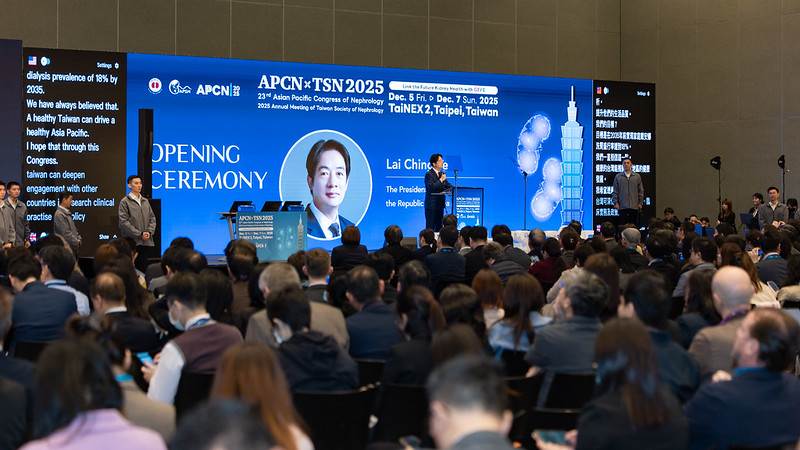
2025-12-05
President Lai attends opening of 23rd Asian Pacific Congress of Nephrology
On the morning of December 5, President Lai Ching-te attended the opening of the 23rd Asian Pacific Congress of Nephrology held in conjuncti...
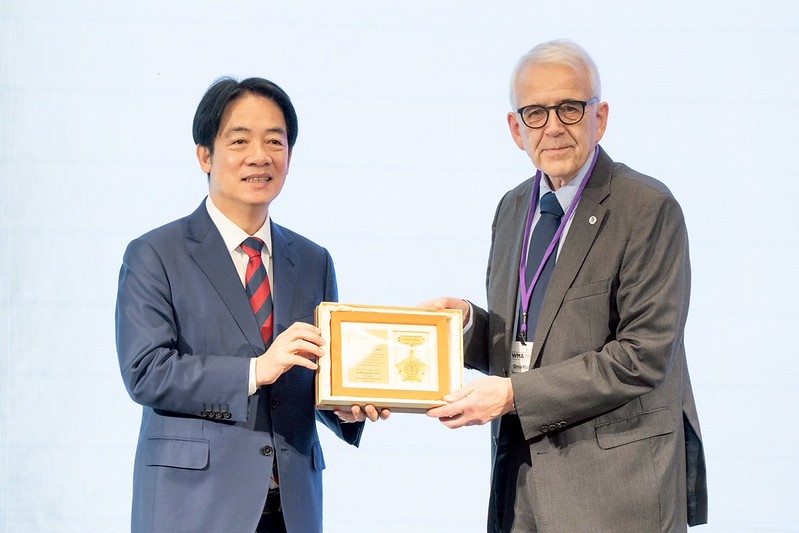
2025-12-04
President Lai attends opening of Taiwan Medical Association’s International Symposium on Transforming Healthcare
On the morning of December 4, President Lai Ching-te attended the opening of the Taiwan Medical Association (TMA)’s International Symp...
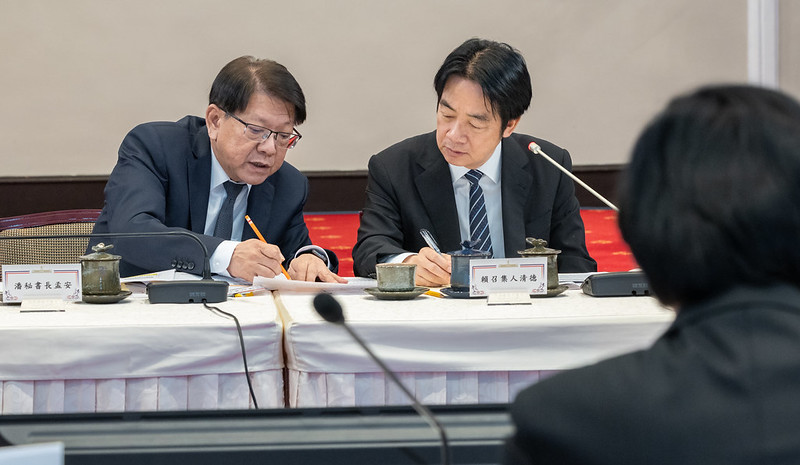
2025-11-27
President Lai presides over sixth meeting of Healthy Taiwan Promotion Committee
On the afternoon of November 27, President Lai Ching-te presided over the sixth meeting of the Healthy Taiwan Promotion Committee. In his op...

2025-09-04
President Lai presides over fifth meeting of Healthy Taiwan Promotion Committee
On the afternoon of September 4, President Lai Ching-te presided over the fifth meeting of the Healthy Taiwan Promotion Committee. In his op...

2025-05-22
President Lai presides over fourth meeting of Healthy Taiwan Promotion Committee
On the afternoon of May 22, President Lai Ching-te presided over the fourth meeting of the Healthy Taiwan Promotion Committee. In his openin...



